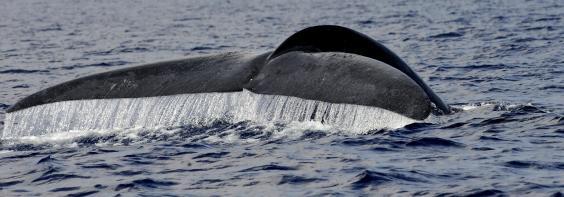Gabon to create one of Africa’s largest marine protected areas
The new marine parks will protect more than 20 species of whales and dolphins, and four species of turtles

Your support helps us to tell the story
From reproductive rights to climate change to Big Tech, The Independent is on the ground when the story is developing. Whether it's investigating the financials of Elon Musk's pro-Trump PAC or producing our latest documentary, 'The A Word', which shines a light on the American women fighting for reproductive rights, we know how important it is to parse out the facts from the messaging.
At such a critical moment in US history, we need reporters on the ground. Your donation allows us to keep sending journalists to speak to both sides of the story.
The Independent is trusted by Americans across the entire political spectrum. And unlike many other quality news outlets, we choose not to lock Americans out of our reporting and analysis with paywalls. We believe quality journalism should be available to everyone, paid for by those who can afford it.
Your support makes all the difference.Gabon today showed its commitment to wildlife extends beyond the government’s determination to protect the forest elephant with the announcement that it will now be creating one of Africa’s largest ever marine protected areas.
The new network, consisting of nine new national marine parks and 11 new aquatic reserves, means that combined with the country’s three existing marine zones some 53,000 square kilometres of ocean will be protected.
The announcement comes at a time when marine biodiversity is seriously threatened. More than 70 percent of the world’s fish stocks are either overexploited or have collapsed and the majority of coral reefs have been damaged. Yet, only around four percent of oceans globally are currently formally protected by marine protected areas.
The announcement was made in a keynote speech at the United Nations Oceans Conference in New York by Gabon’s president, Ali Bongo, who said that 27 per cent of Gabon’s territorial waters would now be protected and the whales, sea turtles, and other marine species inhabiting them now safeguarded.
Marine biologists estimate that between 20 and 30 per cent of a country’s ocean area needs to be protected to maintain biodiversity and restore depleted areas outside the marine parks.
The President told reporters: “Our marine ecosystems are as rich and as precious as our better known rainforests. We had to do for the oceans what my father, the Late President Omar Bongo Ondimba, did for the forests when he created 13 national parks in 2002.”
The new areas will also help curtail unregulated and unsustainable fishing from the international fleets that exploit much of Africa’s coastal waters and help secure local livelihoods by ensuring fisheries are sustained for future generations.
Gabon has long been at the forefront of conservation in Africa and works closely with the Giants Club, the conservation initiative created by Space for Giants that is supported by The Independent, to help protect the countries forest elephants.
The new marine parks were conceived after a research team from the National Geographic’s Pristine Seas Program, the Wildlife Conservation Society and the Gabonese National Parks Agency presented their findings to the President which showed the threats posed to the ecosystem by illegal fisheries.
He instructed the director of Gabon National Parks, Professor Lee White to launch a program that was christened 'Gabon Blue' to design a strategy to protect and restore Gabon marine ecosystems and fish stocks and to develop a plan for sustainable fisheries management.
The new marine parks will protect more than 20 species of whales and dolphins, including humpback whales and Atlantic humpback dolphins, and four species of marine turtles, among them the world’s largest breeding leatherback turtle population and the Atlantic Ocean’s largest breeding olive ridley turtle population.
More than 20 species of sharks and rays also occur in Gabon’s waters, many of which are threatened, including great hammerhead sharks, manta rays, whale sharks and tiger sharks.
Join our commenting forum
Join thought-provoking conversations, follow other Independent readers and see their replies
Comments